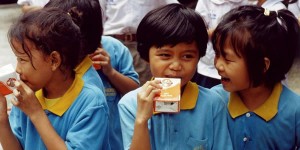Record number ok kids reached by Tetra Pak program
Through Tetra Pak’s school milk business, more than 67 million children received regular milk or other nutritional drinks in Tetra Pak cartons in 2012, an increase of 30% compared with 2011.
Marking the 14th United Nations’ World School Milk Day, the company’s Food for Development Director, Ulla Holm, paid tribute to the role of governments and NGOs in ensuring more and more children benefit from these programmes.
“The significant expansion of school milk programmes is due to the increasing recognition among governments and organisations of the link between the provision of safe nutritional food in schools and the stimulation of local food production and economies,” says Ulla Holm, Global Director of Food for Development Office, Tetra Laval Group.
“In recent years, we not only saw stronger support from governments where school milk programmes were already in place, but also a number of new governments launching the programmes in their countries.”
Government commitment and support was the main driver behind the remarkable 150% growth of the school milk programme in China. Apart from the continuous expansion of the country’s parents-paid school milk programme which was launched in 2000, the most important attribute of the growth was the decision of the government to launch a nutrition supplement project to subsidise and improve the nutritional status of children in remote areas.
Aseptic packaging for milk or other nutritious drinks in school was chosen as a preferred solution due to its convenience and safety benefits. In 2012, 14 million students in China received milk in Tetra Pak packages every day in 28 provinces, 660 cities and 60,000 schools.
Convinced of the benefits that the school milk will bring to the children and to the local dairy industry, in 2013 the Republic of the Union of Myanmar became one of the latest countries to launch a programme. The Myanmar government-led three-year school milk programme, developed with support from Tetra Pak and Tetra Laval Group, focuses on children at critical growth ages, and will benefit approximately 45,000 primary school students.
El Salvador is another example of a country introducing a new school milk programme in 2013, with emphasis placed on food safety control. Today, more than 800,000 children are provided with milk in Tetra Pak aseptic packages in school.
Through the Food for Development Office of the Tetra Laval Group, Tetra Pak has been working actively to support school milk programmes for more than 50 years.
“Creating and promoting school milk programmes require long term investment, commitment and partnership”, adds Ulla Holm. “We are proud to be playing a major part in collaboration with governments, customers, international organisations and NGO’s.” –


































